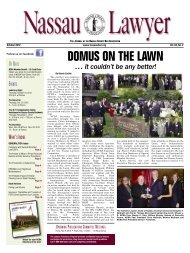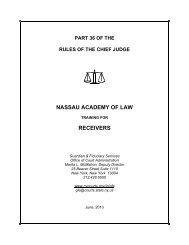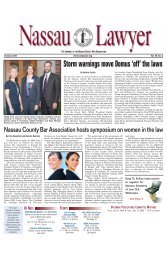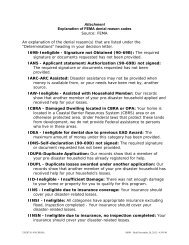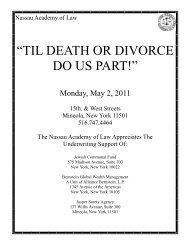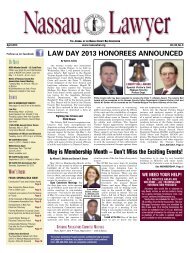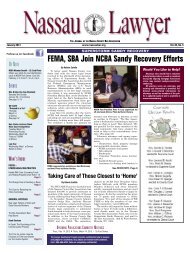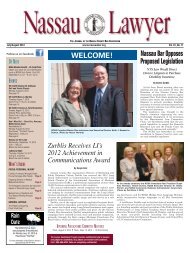FRAUDULENT CONVEYANCES Nassau Academy of Law CLE Live ...
FRAUDULENT CONVEYANCES Nassau Academy of Law CLE Live ...
FRAUDULENT CONVEYANCES Nassau Academy of Law CLE Live ...
Create successful ePaper yourself
Turn your PDF publications into a flip-book with our unique Google optimized e-Paper software.
443 F.3d 180 Page 11443 F.3d 180(Cite as: 443 F.3d 180)Plaintiffs' original application for a default judgmentagainst Briggs was premised on the explicit groundthat the corporation was not represented by counsel.Therefore, it is difficult to comprehend their currentargument that Rosenstock was able to act for Briggs,when Briggs was found in 1993 to be without counsel,despite Rosenstock's presence.This brings us to the third major infirmity with the1997 judgment. The 1993 default judgment was procuredby plaintiffs in part based on their argumentthat counsel could not represent both defendantsRosenstock and Genser, and Briggs, as there was aconflict <strong>of</strong> interest between the corporate <strong>of</strong>ficers andthe corporation. Judge Trager explained that Rosenstock'sinterests were "completely adverse to that <strong>of</strong>Briggs, which had claims against him .... Rosenstockstood only to gain by confessing judgment on behalf<strong>of</strong> Briggs." Grace XI, at 14. Rosenstock was a shareholderand an <strong>of</strong>ficer, which further supports the notionthat he should have been prohibited from alsoacting as a representative <strong>of</strong> Briggs. He had authorityto make some decisions for Briggs, but not this one.A judgment is void under Rule 60(b)(4) <strong>of</strong> the FederalRules <strong>of</strong> Civil Procedure "only if the court thatrendered it lacked jurisdiction <strong>of</strong> the subject matter,or <strong>of</strong> the parties, or if it acted in a manner inconsistentwith due process <strong>of</strong> law." Texlon Corp. v. Mfrs.Hanover Commercial Corp., 596 F.2d 1092, 1099(2d Cir.1979) (quoting 11 WRIGHT & MILLER,FEDERAL PRACTICE AND PROCEDURE, § 2862at 198 (1973)); see also Fustok v. ContiCommodityServs., Inc., 873 F.2d 38, 39 (2d Cir.1989). In orderingthe judgment following the stipulation, the districtcourt acted in a manner inconsistent with dueprocess <strong>of</strong> law. The court wrongly allowed Briggs, acorporation acting through Rosenstock, who was nota lawyer, to execute a stipulation <strong>of</strong> settlement whileappearing pro se. Rosenstock was not acting in theinterest <strong>of</strong> the corporation, but in his own when heagreed to the excessive judgment. Thus, Briggs wasdenied due process <strong>of</strong> law. The 1997 judgment istherefore void under Rule 60(b)(4) and is vacated.The fourth basis comes under Rule 55(d) <strong>of</strong> the FederalRules <strong>of</strong> Civil Procedure, which provides that in"all cases a judgment by default is subject to the limitations<strong>of</strong> Rule 54(c)." Rule 54(c) requires that a"judgment by default shall not be different in kindfrom or exceed in amount that prayed for in the demandfor judgment." Fed.R.Civ.P. 54(c). JudgeTrager explained that the complaint here sought onlyequitable relief against Briggs-- specifically that themerger be set aside or its terms reformed. We made asimilar finding with regard to the same amendedcomplaint:aside from a typical catchall paragraph that mentioneddamages, the only relief requested by theamended complaint was equitable. On the claimsagainst Briggs, it requested rescission <strong>of</strong> themerger or reformation <strong>of</strong> its terms; on the derivativeclaim on behalf <strong>of</strong> Briggs, it sought from theindividual defendants an accounting and disgorgement<strong>of</strong> pr<strong>of</strong>its.Grace IX, 228 F.3d at 51. Judge Trager concludedthat New York BCL Section 623 requires an action toprincipally seek equitable relief, and Judge Levy als<strong>of</strong>ollowed this logic in his dismissal <strong>of</strong> the claimsagainst Genser. See Grace XI, at 17; Grace VIII, at336. According to Judge Trager, awarding damagesas part <strong>of</strong> the default judgment violates Rule 54(c) as*194 "different in kind" from "that prayed for in thedemand for judgment." Id. at 16 (internal quotationmarks omitted). However, because we have alreadyfound that the judgment is void, for the reasons discussedabove, we need not reach this issue.VI. We decline to reach the Rule 60(b)(6) argumentJudge Trager found that the excessiveness <strong>of</strong> thejudgment, "combined with its close resemblance tothe sale price <strong>of</strong> the Briggs real property in 1990,"demonstrated "collusion between Rosenstock andplaintiffs to the detriment <strong>of</strong> movants." Grace XI, at18. This collusion, Judge Trager explained, was anextraordinary circumstance and an undue hardshipunder Rule 60(b)(6), and therefore, he argued, thejudgment should be voided on that basis. Havingaffirmed the district court's decision on the Rule60(b)(4) motion, we decline to address this issue.ConclusionFor the foregoing reasons, we affirm the order andmemorandum <strong>of</strong> the district court in Grace XI, whichgranted non-party movants' motion to vacate thejudgment. As there is no judgment on which to collect,we must also affirm the two orders, Grace XIIand Grace XIII, which dismissed plaintiffs' fraudulentconveyance actions.Grace IAppendix© 2009 Thomson Reuters. No Claim to Orig. US Gov. Works.



